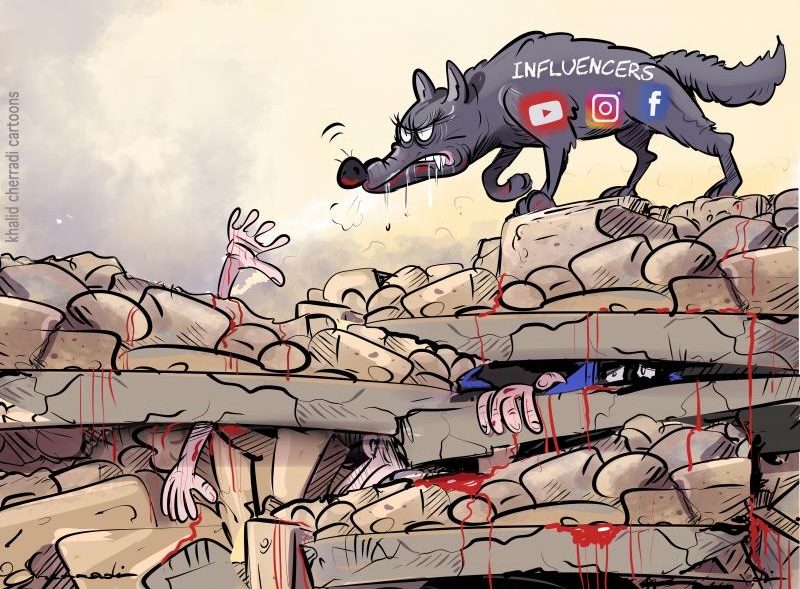
Can we close our eyes and ignore the turmoil around us? Are we forced to remain blind to the realities? Can we afford not to speak about the horrors of what's unfolding in Gaza, Ukraine, and South Lebanon? Influencers worldwide are involving themselves, and are becoming a force to be taken into consideration.
By Darine Saleh
Let’s zoom in on the conflict in Gaza and the war machine that has disregarded all humanitarian standards. The Gaza war will be a pivotal moment and a transformation for influencers and marketers alike.
Nevertheless, the realm of influencer marketing has witnessed a troubling trend. Online celebrities enthusiastically endorse products and trends, often leading to mindless imitation of their lifestyles. This contributes to a superficial and self-centered culture that can exacerbate societal problems.
As we grapple with contemporary crises like the Gaza conflict, the future of influencer marketing seems uncertain. The marketing landscape could change significantly if these conflicts escalate and involve more nations.
Therefore, marketers must adapt their content to align with current events and geopolitical priorities, especially in regions facing poverty, hunger, pollution, inadequate healthcare, pandemics, economic challenges, etc.
Lebanon is an example of the influencer phenomenon, with figures like Nour Arida passionately advocating for the United Nations Sustainable Development Goals (SDGs), promoting gender equality, hunger eradication, and improved health.
Many other Lebanese influencers actively champion the SDGs. For instance, Anthony Rahayel, known as NoGarlicNoOnions, focuses on SDG 2 (Zero Hunger) and SDG 3 (Good Health and Well-being) through his culinary adventures, emphasizing efforts to reduce food waste and improve access to nutritious meals.
Jessica Kahawaty, a Lebanese-Australian model and influencer, uses her platform to raise awareness about environmental issues and sustainability. She supports SDG 13 (Climate Action) and SDG 14 (Life Below Water), advocating for responsible consumption and marine conservation.
Maya Reaidy, a former Miss Lebanon, passionately advocates for women's rights and gender equality (SDG 5), raising awareness about critical issues affecting women and girls in Lebanon and beyond.
These influencers positively impact by leveraging their reach and influence to raise awareness and drive progress towards the Sustainable Development Goals.
It is crucial to acknowledge that, against the backdrop of the COVID-19 pandemic, some influencers have emerged, creating shallow content aimed solely at accumulating viewership and profits.
This trend not only insults viewers' intelligence but also inundates our digital space with insipid and worthless ideas.
The central question remains: Will influencers shift towards creating substantial and meaningful content?
Influencers today encompass not just individuals but also corporations, organizations, and governments. To make a genuine impact, influencers must provide valuable insights and authentic knowledge to navigate the ever-evolving digital landscape.
As we progress into the future, the world must recognize the potential of influencer marketing in driving progress toward sustainable development goals and addressing global social and environmental challenges.
In a world marked by rapid digital transformation and the prevalence of social media, preparedness remains our most valuable asset in overcoming challenges and constructing a more prosperous and sustainable world.
However, we must also ponder the reasons why countries, including Lebanon, have faced challenges in making progress towards these goals. Lebanese society continues to grapple with issues like poverty, hunger, pollution, a weak economy, and many other problems that persist year after year.
While some may attribute these issues to political factors and politicians, a more significant concern is the lack of individual responsibility. In Lebanon, the number of licensed associations working towards these goals is rising.
Still, unfortunately, a significant number of them seem to prioritize generating revenue and immortalizing their founders' names over making a genuine impact on society. Many campaigns and initiatives, despite their noble intentions, may have been hampered by mismanagement or driven by profit motives rather than a genuine desire to raise awareness.
Moreover, in Lebanon, the most significant objectives are often initiated by large corporations aiming primarily for financial gain, increased followers, and reputation enhancement. In such cases, campaigns prioritize financial returns over raising awareness and building a community capable of driving societal change.
This is not meant to diminish the importance of these associations and initiatives. Instead, it underscores the critical need for skilled individuals who can create meaningful and effective awareness campaigns.
Content creators with expertise in their respective fields are essential for delivering messages that resonate with the audience and drive real change. Success should be measured by achieving societal objectives rather than merely financial gains for companies, associations, or individuals.
Campaigns with significant goals should be primarily driven by a commitment to make a positive impact.
If individuals collectively take social responsibility seriously, Lebanon, with its intellectual potential, could address the persistent issues of poverty, hunger, and economic challenges that have plagued the country for too long.
Influencer marketing holds significant sway over our thoughts, habits, and traditions, making it imperative that we scrutinize the ideas presented to us rather than unquestioningly accepting them.






